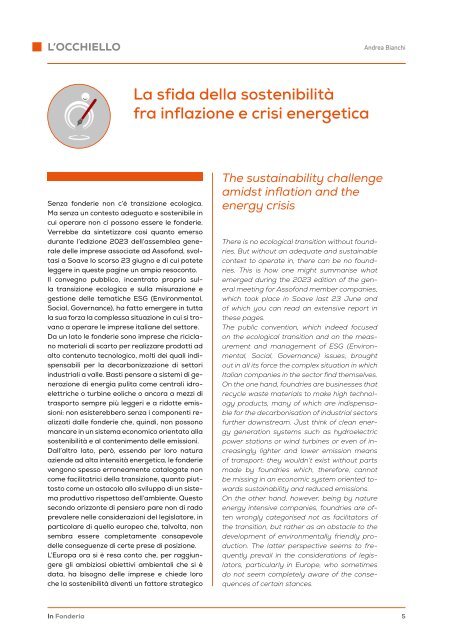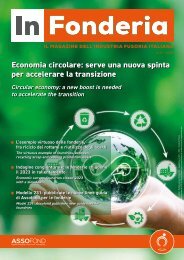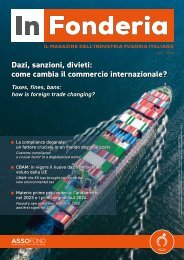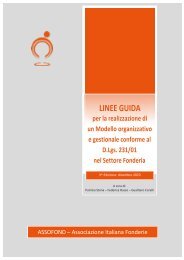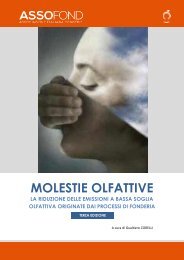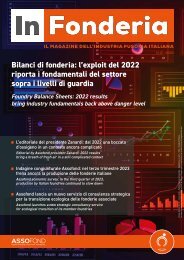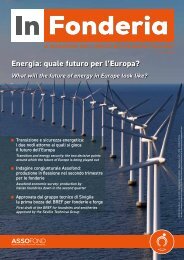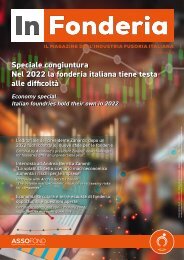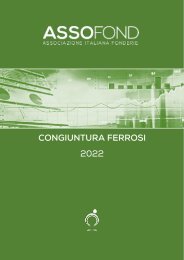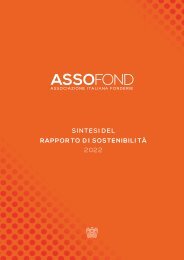In Fonderia 4 2023
Quarto numero del 2023 di In Fonderia
Quarto numero del 2023 di In Fonderia
Create successful ePaper yourself
Turn your PDF publications into a flip-book with our unique Google optimized e-Paper software.
L’OCCHIELLO<br />
Andrea Bianchi<br />
La sfida della sostenibilità<br />
fra inflazione e crisi energetica<br />
Senza fonderie non c’è transizione ecologica.<br />
Ma senza un contesto adeguato e sostenibile in<br />
cui operare non ci possono essere le fonderie.<br />
Verrebbe da sintetizzare così quanto emerso<br />
durante l’edizione <strong>2023</strong> dell’assemblea generale<br />
delle imprese associate ad Assofond, svoltasi<br />
a Soave lo scorso 23 giugno e di cui potete<br />
leggere in queste pagine un ampio resoconto.<br />
Il convegno pubblico, incentrato proprio sulla<br />
transizione ecologica e sulla misurazione e<br />
gestione delle tematiche ESG (Environmental,<br />
Social, Governance), ha fatto emergere in tutta<br />
la sua forza la complessa situazione in cui si trovano<br />
a operare le imprese italiane del settore.<br />
Da un lato le fonderie sono imprese che riciclano<br />
materiali di scarto per realizzare prodotti ad<br />
alto contenuto tecnologico, molti dei quali indispensabili<br />
per la decarbonizzazione di settori<br />
industriali a valle. Basti pensare a sistemi di generazione<br />
di energia pulita come centrali idroelettriche<br />
o turbine eoliche o ancora a mezzi di<br />
trasporto sempre più leggeri e a ridotte emissioni:<br />
non esisterebbero senza i componenti realizzati<br />
dalle fonderie che, quindi, non possono<br />
mancare in un sistema economico orientato alla<br />
sostenibilità e al contenimento delle emissioni.<br />
Dall’altro lato, però, essendo per loro natura<br />
aziende ad alta intensità energetica, le fonderie<br />
vengono spesso erroneamente catalogate non<br />
come facilitatrici della transizione, quanto piuttosto<br />
come un ostacolo allo sviluppo di un sistema<br />
produttivo rispettoso dell’ambiente. Questo<br />
secondo orizzonte di pensiero pare non di rado<br />
prevalere nelle considerazioni del legislatore, in<br />
particolare di quello europeo che, talvolta, non<br />
sembra essere completamente consapevole<br />
delle conseguenze di certe prese di posizione.<br />
L’Europa ora si è resa conto che, per raggiungere<br />
gli ambiziosi obiettivi ambientali che si è<br />
data, ha bisogno delle imprese e chiede loro<br />
che la sostenibilità diventi un fattore strategico<br />
The sustainability challenge<br />
amidst inflation and the<br />
energy crisis<br />
There is no ecological transition without foundries.<br />
But without an adequate and sustainable<br />
context to operate in, there can be no foundries.<br />
This is how one might summarise what<br />
emerged during the <strong>2023</strong> edition of the general<br />
meeting for Assofond member companies,<br />
which took place in Soave last 23 June and<br />
of which you can read an extensive report in<br />
these pages.<br />
The public convention, which indeed focused<br />
on the ecological transition and on the measurement<br />
and management of ESG (Environmental,<br />
Social, Governance) issues, brought<br />
out in all its force the complex situation in which<br />
Italian companies in the sector find themselves.<br />
On the one hand, foundries are businesses that<br />
recycle waste materials to make high technology<br />
products, many of which are indispensable<br />
for the decarbonisation of industrial sectors<br />
further downstream. Just think of clean energy<br />
generation systems such as hydroelectric<br />
power stations or wind turbines or even of increasingly<br />
lighter and lower emission means<br />
of transport: they wouldn’t exist without parts<br />
made by foundries which, therefore, cannot<br />
be missing in an economic system oriented towards<br />
sustainability and reduced emissions.<br />
On the other hand, however, being by nature<br />
energy intensive companies, foundries are often<br />
wrongly categorised not as facilitators of<br />
the transition, but rather as an obstacle to the<br />
development of environmentally friendly production.<br />
The latter perspective seems to frequently<br />
prevail in the considerations of legislators,<br />
particularly in Europe, who sometimes<br />
do not seem completely aware of the consequences<br />
of certain stances.<br />
<strong>In</strong> <strong>Fonderia</strong><br />
5


